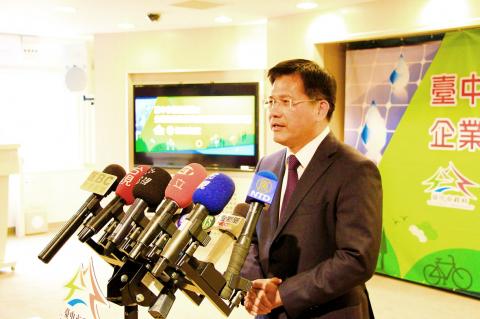The East Asian Olympic Committee yesterday announced that it has revoked Taichung’s right to host the first East Asian Youth Games due to “political factors” after the city had already spent nearly NT$677 million (US$22.04 million) on preparations for the event.
The government denounced what it called China’s “barbaric” interference in the committee.
The decision was made at a provisional committee meeting in Beijing yesterday, reportedly due to pressure from China, which is unhappy about a referendum proposal to rename Taiwan’s national sports team from “Chinese Taipei” to “Taiwan” for the 2020 Tokyo Olympics.

Photo: CNA
The committee is comprised of representatives from Taiwan, China, Hong Kong, Macau, North Korea, South Korea, Mongolia, Japan and Guam.
All members except Taiwan and Japan voted against Taichung retaining the right to host the Games, the Ministry of Foreign Affairs said.
Taiwan voted in favor of Taichung hosting the event, while Japan abstained, it said.
Taichung in October 2014 won the bid to host the Games, which would have been the first within the Olympic family hosted by Taiwan. They were preceded by the East Asian Games, which in 2013 transformed into a youth sports event.
The Taichung City Government said that since winning the bid, it has poured NT$677 million into planning and building facilities for the Games, in which nearly 2,300 athletes from nine nations were expected to participate.
Calling the decision regrettable, the city government urged the committee to refrain from sacrificing the rights of athletes due to political interference.
“Doing so not only runs counter to the Olympic spirit and sporting ethics, but also nullifies all of the efforts young athletes and Taichung residents have invested in the Games,” the city government said in a statement, adding that it would take the case to the international community.
The Presidential Office also expressed strong regret over the decision and Beijing’s irrational behavior.
“Sports transcend borders and are conducive to fostering mutual understanding among people from different nations and of different ethnicities. They are the best catalyst for the promotion of harmony in the international community,” it said.
The decision showed that the committee did not take the Games seriously and was subjecting Taichung to extremely unfair treatment, it added.
The ministry said it was infuriated by the decision and the damage China has caused to sporting events and exchanges for political reasons.
It said that upon learning that China was interfering with Taichung’s right to host the Games, it immediately instructed its overseas representative offices in Japan, South Korea, Mongolia and Palau — which also oversees affairs in Guam — to lobby for the city to retain the Games.
“Unfortunately, we were not able to stop China’s brutal actions, but we appreciate Japan’s support,” the ministry said, urging China to leave politics out of sporting events and calling on like-minded nations to make a joint effort to stop Beijing’s destructive behavior.
Additional reporting by CNA

DAREDEVIL: Honnold said it had always been a dream of his to climb Taipei 101, while a Netflix producer said the skyscraper was ‘a real icon of this country’ US climber Alex Honnold yesterday took on Taiwan’s tallest building, becoming the first person to scale Taipei 101 without a rope, harness or safety net. Hundreds of spectators gathered at the base of the 101-story skyscraper to watch Honnold, 40, embark on his daredevil feat, which was also broadcast live on Netflix. Dressed in a red T-shirt and yellow custom-made climbing shoes, Honnold swiftly moved up the southeast face of the glass and steel building. At one point, he stepped onto a platform midway up to wave down at fans and onlookers who were taking photos. People watching from inside

A Vietnamese migrant worker yesterday won NT$12 million (US$379,627) on a Lunar New Year scratch card in Kaohsiung as part of Taiwan Lottery Co’s (台灣彩券) “NT$12 Million Grand Fortune” (1200萬大吉利) game. The man was the first top-prize winner of the new game launched on Jan. 6 to mark the Lunar New Year. Three Vietnamese migrant workers visited a Taiwan Lottery shop on Xinyue Street in Kaohsiung’s Gangshan District (崗山), a store representative said. The player bought multiple tickets and, after winning nothing, held the final lottery ticket in one hand and rubbed the store’s statue of the Maitreya Buddha’s belly with the other,

‘NATO-PLUS’: ‘Our strategic partners in the Indo-Pacific are facing increasing aggression by the Chinese Communist Party,’ US Representative Rob Wittman said The US House of Representatives on Monday released its version of the Consolidated Appropriations Act, which includes US$1.15 billion to support security cooperation with Taiwan. The omnibus act, covering US$1.2 trillion of spending, allocates US$1 billion for the Taiwan Security Cooperation Initiative, as well as US$150 million for the replacement of defense articles and reimbursement of defense services provided to Taiwan. The fund allocations were based on the US National Defense Authorization Act for fiscal 2026 that was passed by the US Congress last month and authorized up to US$1 billion to the US Defense Security Cooperation Agency in support of the

‘COMMITTED TO DETERRENCE’: Washington would stand by its allies, but it can only help as much as countries help themselves, Raymond Greene said The US is committed to deterrence in the first island chain, but it should not bear the burden alone, as “freedom is not free,” American Institute in Taiwan Director Raymond Greene said in a speech at the Institute for National Defense and Security Research’s “Strengthening Resilience: Defense as the Engine of Development” seminar in Taipei yesterday. In the speech, titled “Investing Together and a Secure and Prosperous Future,” Greene highlighted the contributions of US President Donald Trump’s administration to Taiwan’s defense efforts, including the establishment of supply chains for drones and autonomous systems, offers of security assistance and the expansion of